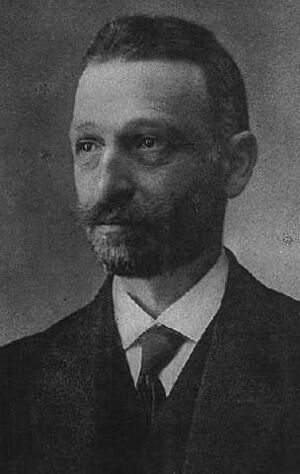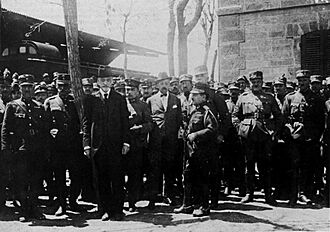Dimitrios Gounaris facts for kids
Quick facts for kids
Dimitrios Gounaris
|
|
|---|---|
|
Δημήτριος Γούναρης
|
|

Gounaris c. 1915
|
|
| Prime Minister of Greece | |
| In office 26 March 1921 – 3 May 1922 |
|
| Monarch | Constantine I |
| Preceded by | Nikolaos Kalogeropoulos |
| Succeeded by | Nikolaos Stratos |
| In office 25 February 1915 – 10 August 1915 |
|
| Monarch | Constantine I |
| Preceded by | Eleftherios Venizelos |
| Succeeded by | Eleftherios Venizelos |
| Personal details | |
| Born | 5 January 1867 Patras, Kingdom of Greece |
| Died | 28 November 1922 (aged 55) Goudi, Athens, Kingdom of Greece |
| Cause of death | Execution by firing squad |
| Political party | People's Party |
Dimitrios Gounaris (born 5 January 1867 – died 28 November 1922) was an important Greek politician. He served as the Prime Minister of Greece two times. His first term was from February to August 1915. His second term was from March 1921 to May 1922. He led the People's Party. Gounaris was a main political rival of Eleftherios Venizelos, another famous Greek leader.
Contents
Early Life and Education
Dimitrios Gounaris first studied law at Athens University. After that, he continued his studies in Germany, France, and England. When he finished his studies, he went back to his hometown of Patras.
In 1902, Gounaris was elected as a "deputy" for Achaea. A deputy is like a representative in the government. He was known for being a great speaker. He was also part of a group called the "Japanese Group". This group was against the government led by Georgios Theotokis.
In 1908, Gounaris joined the government as the Finance Minister. He hoped to make many changes and improvements. However, he had to resign from his position soon after. Gounaris had modern ideas, like admiring Germany's social laws. But his political views were generally conservative. This made him a leading opponent of Eleftherios Venizelos.
First Time as Prime Minister
Gounaris became Prime Minister for the first time in 1915. This happened after Venizelos resigned. King Constantine I appointed him to the role.
During this time, Gounaris was against Venizelos's policies. He supported Greece remaining neutral in conflicts. Because of his views, he was sent away to Corsica in 1917. Other important people who were against Venizelos were also exiled. This happened after Venizelos returned to power in Athens.
Gounaris managed to escape to Sardinia, Italy, in 1918. He could only return to Greece in 1920. He came back to take part in important elections in November. He was seen as the main leader of the "United Opposition" group. This was during the Greco-Turkish War.
Second Term and the War with Turkey

After Venizelos lost the election, Gounaris had a lot of influence in the parliament. He was the main force behind the royalist governments that followed. However, he only became Prime Minister himself in March 1921.
Gounaris was open to finding a peaceful solution with the Turks. He showed this during talks in London in early 1921. But to put more pressure on the Turkish forces, he agreed to a Greek attack in March 1921. The Greek Army was not fully ready for this. The attack was pushed back in the Second Battle of İnönü. This was the first time Greece lost a battle in the Greco-Turkish War.
In July, the Greek army advanced towards Eskişehir and Afyon. Gounaris then pushed for the army to continue towards Ankara. However, this advance was stopped at the Battle of Sakarya. After the Greeks pulled back to set up a new defensive line, Gounaris asked for help from other powerful countries, especially the United Kingdom of Great Britain and Ireland. He asked them to help find a peaceful solution.
Gounaris even warned the British that Greece might pull its army out on its own. But his government kept the Greek Army in its positions. They felt they could not politically afford to leave Asia Minor. Many Greeks lived there, and they feared what would happen to them. A growing political crisis caused Gounaris's government to fall in May 1922. He barely won a vote of confidence, which is a vote to see if the government still has support. But because his supporters were strong in the National Assembly, he simply changed roles. He became the Justice Minister in the government of Petros Protopapadakis.
Trial and Legacy
In August 1922, the Greek army suffered a big defeat by Mustafa Kemal's forces. After this disaster, parts of the Greek Army rebelled in September. The government was then removed from power.
The rebels, mostly supporters of Venizelos, formed a special court. This court was set up to judge those they believed were responsible for the defeat. This event is known as the "Trial of the Six". In November 1922, the court found the accused people, including Gounaris, guilty of betraying their country. Gounaris and the others were put to death at Goudi on the same day, 28 November.
Many people believe that Gounaris did have some responsibility for the military and diplomatic choices that led to Greece's defeat in 1922. However, his trial and execution are widely seen as an act of "scapegoating." This means he was blamed for problems that were bigger than him. It was also likely driven by the strong dislike the Venizelist group had for him.
Gounaris, along with some other conservative politicians, was among the first to suggest changing the Greek Constitution. They wanted to allow women the right to vote. This change, however, did not pass at the time. Dimitrios Gounaris was the uncle of Panagiotis Kanellopoulos, who also became a Prime Minister later.
See also
 In Spanish: Dimítrios Goúnaris para niños
In Spanish: Dimítrios Goúnaris para niños
 | Aurelia Browder |
 | Nannie Helen Burroughs |
 | Michelle Alexander |

